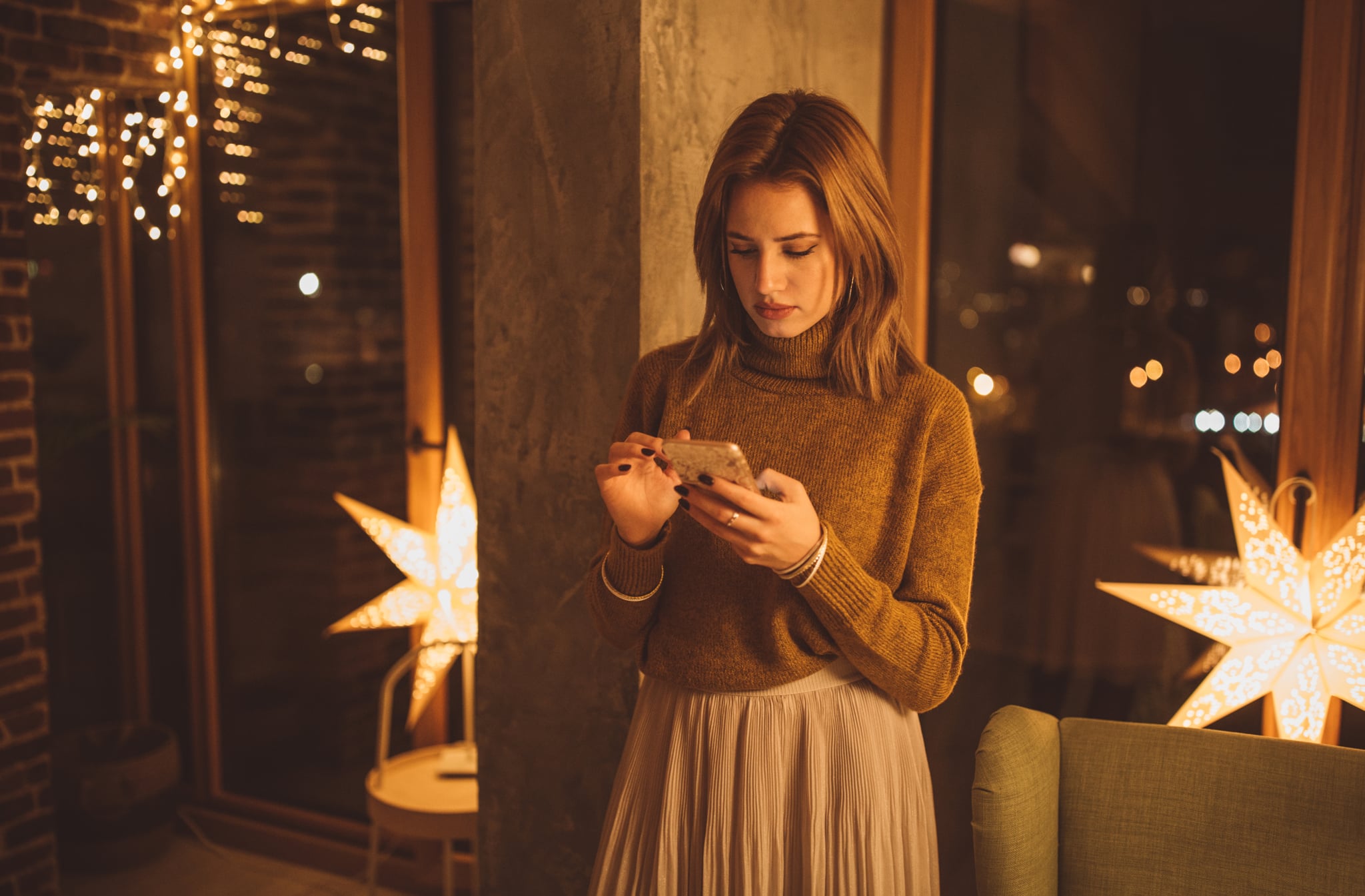
It’s happened to all of us: you’re at a party or a work event, chatting, eating, and drinking, when your energy starts to wane. You can’t engage in the conversation. You’re glancing at your phone and looking around for an exit. You start to fantasize about being in bed or just getting a moment to yourself. It’s official: your social battery is drained, and you won’t be fully present again until you can recharge it.
Everyone has a social battery, which is essentially “a tool we can use to measure the amount of energy we have to engage socially,” Alexandra McNulty, LCSW-C, a psychotherapist specializing in anxiety disorders, says. Each person has a different capacity for social interaction, which is affected by many things: how we’re feeling mentally and physically, where we are on the introversion-extroversion spectrum, and any factors that might contribute to power imbalances, like racism or professional hierarchies, McNulty says.
You might notice your social battery getting low over the course of one day or night, or it could be something that builds up over time as your social calendar stacks up without recharging time (think: the holidays, family gatherings, multiday events). But why does our social battery get low in the first place, and what should you do when it gets there? POPSUGAR talked to three mental health experts to find out.
Why Is My Social Battery Low?
Your social battery “is the juice that keeps you energized and engaged in social settings,” Elyse Schunkewitz, LSCW, a holistic psychotherapist and personal trainer, tells POPSUGAR. Each person’s social battery is “as unique as their thumbprint.” Some of us thrive when social plans accumulate; others need a week or two between events to get their energy back up. Either way, your nervous system only has so much capacity for any type of activity, and that includes socializing. At some point, even the most extroverted of us will need some downtime.
Many things can drain your social battery, and it often happens during times like the holidays when you’re being pulled in different directions, McNulty says. “Everyone’s social battery is different in how quickly it gets drained, what activities are likely to deplete it, and how fast it can recharge,” psychotherapist Kelly Neupert, LPC, tells POPSUGAR. These are some situations that might drain your social battery, according to our experts.
- A long stretch of social plans without adequate time to recharge.
- Neglecting nonsocial needs or duties (like work, sleep, or exercise).
- Being around people with whom you can’t be your true, authentic self.
- Worrying about social plans.
- Scrolling through social media.
Yes, you read those last two right. You don’t have to be actively socializing with people to drain your social battery, McNulty says, calling these situations “sneaky” battery drainers. “Even when we aren’t being social, worrying about a bunch of social events coming up can be like keeping a bunch of tabs and apps open on your phone,” she explains. Just as having all those apps and tabs open will eventually drain your phone’s battery in the background, all of that general stress and anxiety around social situations can drain your social battery before you even open the party door. Schunkewitz agrees, saying that for some of us, “the anxiety that comes with socializing is more draining than the socializing itself.” Similarly, scrolling through social media can contribute to a waning social battery “because this can activate the same cognitions and brain functions as social events,” McNulty explains, which tires out the social portion of your brain.
And it’s worth noting that not all social situations will affect your social battery in the same way. For example, you might thrive in one-on-ones or smaller group settings and actually feel recharged after those outings, Neupert explains, but become exhausted after larger group events. The best way to figure out what drains your social battery is to pay attention to how you feel before, during, and after certain social situations or periods of time with lots of social events.
Low Social Battery: Signs to Watch Out For
How can you tell if your social battery is getting low? Chances are, you’ll know it when you feel it: exhaustion, grumpiness, and a desire to press pause on the event and head up to bed for a bit. When your social battery is getting depleted, you might feel:
- Disinterested in activities or subjects you usually enjoy.
- Overwhelmed by smaller social obligations, like answering a text.
- On edge, irritated, or resentful of others, including friends.
- Physical pain, such as headaches, backaches, or low energy.
- A desire to pull an “Irish exit” (leave without saying goodbye) more than usual.
- Quieter than usual because you’re exhausted from conversation.
- Desperate to go home.
- A strong desire to cry.
- Symptoms of depression.
These signs of a low or drained social battery can apply on a micro- or macrolevel. That is, you might feel symptoms over the course of one outing or as an accumulation over multiple events, Schunkewitz says. To pick up on your own signs of social burnout, take some time to check in with yourself before and after a social event, Neupert says. “Are you excited to go, dreading it, or feeling meh? When you’re there, are you enjoying yourself or counting down the minutes until you go home? Do you feel this way no matter what the activity, or is it mainly in large groups of people?” Picking up on what situations drain your social battery and signs to look out for can help you pause your schedule before you get to the point of total exhaustion.
What to Do When You’ve Drained Your Social Battery
If you realize your social battery is totally drained in the middle of an event, the best thing to do is take a break. Step outside, or go the bathroom. Try box breathing, do some light stretching, or gargle water for 30 seconds, which Schunkewitz says will activate your vagus nerve and help to calm you down. Take a quick walk around the block, grab a drink of water, or hang out with pets for a few minutes to get away from more draining conversations.
If your social battery is getting low frequently or you have a long string of social events coming up, our experts recommend a few techniques that can help to lessen or prevent social burnout.
- Schedule “me time” between events. Do your best to find pockets of time between social events, no matter how short, to slow down and ground yourself. This can be as simple as taking a quick walk before the next meeting at a work conference, or it can be more robust, like scheduling a self-care day between holiday parties. McNulty recommends scheduling this time directly into your calendar, so it feels as important as your other events and obligations (because it is!).
- Prioritize activities that recharge you. In other words, don’t use your rest time to scroll on TikTok or binge-watch Netflix unless that truly rejuvenates you. It’s time to engage in activities that ground and recharge you, like exercise, sleep, reading, good nutrition, sunlight, breathwork, and meditation, Schunkewitz says. “Be intentional about the activities that make you feel good and give you energy,” Neupert adds, rather than looking for something to numb you. And make sure to be present during this alone time. “When you are spending time with yourself, choose to be as engaged and present as you’d be with another person,” McNulty advises.
- Take a hard look at the people you spend time with. If you notice that your social battery frequently gets drained by being around a particular person or group of people, it may be a sign that you can’t be your authentic self around them, Neupert says. Consider limiting your time around these people, who are likely depleting your energy without giving anything back.
- Set boundaries. “It’s OK to not be at every social event,” Neupert says. If you find it draining to show up for everything, “pick and choose the ones that matter to you and that you’ll actually be present (not just physically) for,” she says. “People care more about whether you showed up, not how long you stayed,” Schunkewitz adds, so you might also consider making shorter appearances when possible.
- Acknowledge your feelings. If you’re struggling with shame or guilt about your exhaustion or you’re experiencing FOMO for skipping events due to social burnout, know that “it’s OK and normal to feel those things,” Neupert stresses. Allow yourself to feel them, then let them pass. “You’ll find yourself in trouble and on edge if you let those feelings dictate the boundaries you set or push you to go to something you know you’ll be miserable at,” Neupert explains.
- Speak to a therapist. If you find your social battery frequently being drained and these tools aren’t helping or you’re not sure how to implement them, consider seeing a mental health professional to help you preserve your energy and budget your time effectively.
When your social life gets busy, it’s all too easy to flit from one event to the next with no rest in between. That can even be fun and exhilarating — until you burn your social battery into exhaustion. As important as it is to maintain friendships and be social, “your relationship with yourself is arguably the most important relationship you will ever have,” Schunkewitz says. Don’t neglect yourself, even when your social life gets hectic, she adds. “Taking time to rest, recover, and rejuvenate on your own is one of the best things you can do for your social life.”
